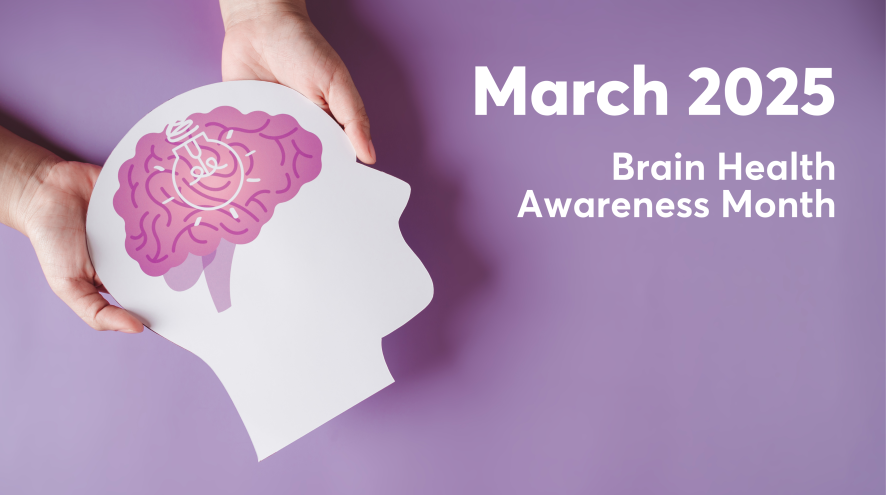March is Brain Health Awareness Month
Just like the rest of your body, your brain needs looking after.

The brain is one of our most vital organs, essential to everything we do.
It's never too early—or too late—to make changes that can support and enhance your brain health, potentially reducing your risk of dementia. By following these tips and strategies, you're not only reducing your risk of dementia, but you're also:
- Protecting your long-term brain health
- Lowering your risk of other cognitive and chronic conditions
- Enhancing your overall well-being
Challenge Your Brain
There are individuals living with dementia who have shared that challenging their brains helps them maintain a good quality of life and manage everyday activities.
- Try something you’re not good at doing! For example, using your less dominant hand to brush your hair or brush your teeth can improve your brain and give it more flexibility.
- Play a game of chess, tabletop games, word and number puzzles, or memory games. If you are using a mobile device, look for games where you can interact with others.
- Pursue a new interest by learning a new language, musical instrument, taking a course, or plan a visit to a local gallery or museum.
Be Socially Active
Staying connected with others seems to have a protective effect against dementia, helping to keep your brain healthy while also reducing feelings of depression and social isolation.
- Make the most of your day by finding opportunities to connect with others, whether it's with a barista, a neighbour or someone you pass on a walk!
- Maintain old friendships and make new ones. If meeting in person isn't possible, consider scheduling weekly phone calls, connecting through email, or staying in touch on social media.
- Volunteering at a local charity or a place you enjoy can boost your confidence while keeping you socially engaged in your community.
- Join a hobby or social group, like Brain Waves Café, or an exercise group like Minds in Motion®.
Healthy Lifestyle
Healthy eating can reduce the risk of heart disease, stroke, and diabetes—key risk factors for dementia. Nutritious food supports overall health, helps maintain brain function, and combats cognitive decline.
- A diverse diet packed with dark-coloured fruits and vegetables, along with foods rich in antioxidants can provide numerous benefits. It's best to limit processed foods, meat, sweets, and dairy. Instead, focus on incorporating more fruits, vegetables, whole grains, nuts, olive oil, and fish.
- Regular physical activity helps to maintain heart health. If you can, try to make time for walking to keep your feet moving.
- Reduce stress through meditation, deep breathing, yoga, mindfulness, or activities like reading, writing, or drawing. Chronic stress can lead to vascular changes and chemical imbalances that harm the brain, increasing the risk of conditions like depression and high blood pressure.
- Avoiding harmful habits like smoking and excessive alcohol consumption can help protect your brain and overall health and well-being.
- Smoking reduces blood flow to the brain, increasing the risk of cognitive decline.
- Excessive alcohol consumption can cause brain damage and disrupt cognitive function.
- See your doctor regularly for checkups. This will help address specific concerns and catch potential health-related concerns early.
Protect Your Head
It's important to recognize that our daily choices play a significant role in maintaining long-term brain health. It is important to protect your body from trauma that could increase your risk of dementia.
- Avoid activities where you might put your brain at risk of harm. If you are engaging in these activities, wearing a helmet can help reduce the risk concussions or brain injury.
- Make sure to check your surroundings for safety hazards to help avoid falls.
- Always make sure you are wearing a seatbelt to safeguard yourself in case of an accident and minimize the risk any injuries.
If you are looking for more information on brain health, our education team is here to provide information and support. You can contact us by email at [email protected], or by calling 905-576-2567.
Other Helpful Resources
Alzheimer Society of Canada. Brain-healthy tips to reduce your risk of dementia. alzheimer.ca/brainhealth
Alzheimer Society of Canada. Heads up for healthier living. alzheimer.ca/challenge
Government of Canada. Canada's food guide. canada.ca/foodguide
Government of Canada. Concussion: Prevention and risks. https://www.canada.ca/en/public-health/services/diseases/concussion-sign-symptoms/concussion-prevention-risks.html
Government of Canada. Physical activity and your health. https://www.canada.ca/en/public-health/services/being-active/physical-activity-your-health.html
